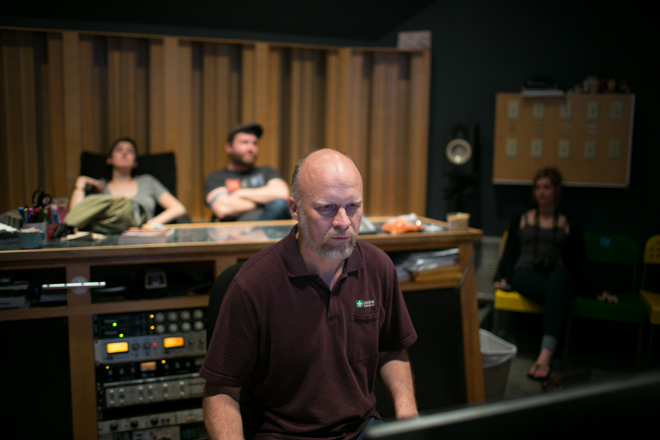Spencer Albee
PROFILE-August 2013
By Katy Kelleher
Photographs by Matt Cosby
The Gentleman Rockstar
From the moment I sat down in Spencer Albee’s messy studio, I knew this was going to be an unusual interview. The first thing this prolific musician did, before even addressing our reason for meeting or the recording device that sat blinking in my lap, was to create a “Bane Cup.” He ripped the bottom off a paper cup, labeled it BANE with a sharpie, and began speaking into it in a rough, accented voice that sounded a little like Sean Connery gargling with seawater. “You know, Bane, like from The Dark Knight Rises,” he offered in explanation.
I did know, but even if I hadn’t been familiar with Christopher Nolan’s darkly entertaining Batman trilogy, I still would have laughed. Albee has that effect on people; he’s witty and warm, a self-described nerd with a penchant for puns and a belief in karma. He may be serious about his craft, but he is never in danger of taking himself too seriously. This lightness, this excited, hopeful quality, seems to shine through in even his loudest, most raucous work.
Bane impression aside, Albee is known throughout Maine for a variety of reasons. Some nights, you’ll find him behind the bar at Sonny’s, pouring brews and chatting with the customers. Some nights he spends on stage at the State Theatre, playing furiously catchy rock tunes with his band, As Fast As. Those with an ear tuned to the past may have enjoyed one of his famous Beatles nights, where Albee and a host of other musicians recreate some of the greatest pop songs of all time. Or maybe you know him from Rustic Overtones, a rock/jazz/funk band that has reached legendary status in Portland (and a well-earned spot on the national music map). In his almost 20-year career, he has opened for Dashboard Confessional, recorded an album on Tommy Boy Records, worked with David Bowie’s favorite producer, and moved in and out of bands with the dynamic force of a star quarterback, traded from team to team.
But Albee’s career hasn’t been all cheering crowds and celebrity encounters. Like all dreamers, he has been served his fair share of reality checks. Instead of growing sour and embittered, he has retained a kid-like excitement for both his own musical ambitions and those of his fellow Portland performers.
Most recently, Albee has been making waves with a multifarious group of musicians who have deemed themselves the League of Bandsmen. Although the name sounds like a group of crime-fighting orchestra members, the actual concept is much cooler. The League of Bandsmen is a musical support group, formed around artists with a similar vision. It’s also a business, a branding tool that supports the growth of every bandsman’s musical output. And finally—or perhaps, most importantly—it’s a big, messy, loving family.
“This has been building slowly for the past five years, but we are just starting to launch the brand,” says Albee. “We all work really hard on our craft as musicians, but when it comes down to it, we are trying to put out work in a marketplace, and I feel that it is possible to do this in a non-shameful way.” To achieve this task, the League of Bandsmen work collaboratively to create albums that are worthy of their grandiose name. Not every member plays in every band, but all the Bandsmen are connected somehow, whether it’s through lending vocals to a single track or joining in for a stint on stage. As Albee talks, he lists off names with an easy familiarity. I imagine a massive dinner table, with all these talented singers, songwriters, strummers, and drummers clustered around, talking over each other and swigging beer. A cacophony of camaraderie. Turns out, I’m not too far off. The League of Bandsmen truly do get together for barbecues and brews. “It’s a vibe,” Albee explains. “Our musical styles are wide-ranging, but what we do have in common is that everyone can play their instrument, they can sing, and everyone works incredibly hard. We all have the work ethic. And it’s never style over substance.”
Hearing Albee describe his newest ventures, I’m struck by how joyous it all sounds. He’s creating a brand built on positive energy and hard work, with a “no bullshit rule” to keep the members honest. There are other guidelines as well. “Our first bylaw is everyone must at all times conduct themselves in a gentlemanly fashion,” Albee says in his half-laughing tone. But even though he sees the humor in his so-called laws, he stands by the general principle: “Be polite. Be thorough. Respond to people.” He adds after a brief pause, “Don’t be a rock star.”
There’s a certain obvious irony to his final point, particularly because much of Albee’s body of work would be handily filed under rock ‘n’ roll. However, his recent endeavors are a bit more difficult to categorize. Sitting in his studio, surrounded by the eclectic detritus of a music maker (beer koozies, vinyl albums, tambourines, maracas, even a plastic recorder), Albee played me a selection of songs from three of his latest albums. We started with Candy, Cake and Ice Cream, by Spencer and the School Spirit Mafia, a group that formed in 2010. The album, which at the time of this interview was still unreleased, has a fantastic vintage feel to it. It’s feel-good pop music, inspired by the greats: the Kinks, the Beach Boys, and the Beatles. As we listen, Spencer taps his feet along, occasionally interrupting the music with snippets of backstory. “My mission in my mind was to write a soundtrack to a Wes Anderson film that doesn’t exist,” he says between songs. It’s a tall order, of which Albee seems aware, if undeterred. As we listen to the Anderson-inspired track, he pulls faces and slaps his knees, occasionally raising his arms to gesture at the bouncing sounds. His excitement is extremely physical—not to mention quite contagious.
It’s nearing time for me to head home, but I don’t want to leave without hearing his latest work. The album, simply titled Spencer, marks the sonic convergence of his meandering career; there are bright horn sections, songs driven by reggae beats, tracks that bounce with the raw energy of rock, and as always, echoes of the Beatles. I pity the Bull Moose employee who has to file it by genre. As I listen, I’m reminded of something he said at the very beginning of our interview: “It’s not always about the sound, but about the vibe.” Like his League of Bandsmen, united by a common goal, or his various musical projects, which come together and drift apart in endlessly new mutations, Spencer’s self-titled album is a melding of styles and sounds, fused seamlessly by an elusive concept. I can’t think of any other way to describe the string that ties it all together than simply this: it’s all about the good vibes.


















